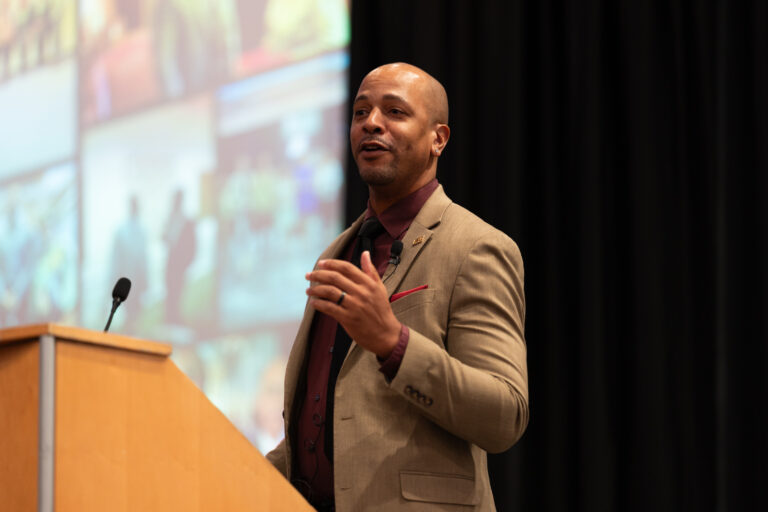
In the month of March, communities around the world came together to recognize and celebrate Social Work Month, an annual observance honoring the invaluable contributions of social workers who dedicate their lives to improving the well-being of individuals, families and society at large.
Our Department of Social Work recently hosted its Green Honors Chair Anthony Estreet, Ph.D., MBA, LCSW, CEO of the National Association of Social Workers, delving into the endless ways social workers and social service professionals can invigorate and strengthen their commitment to social work and its values.
As the world keeps evolving, social workers are rising to meet the needs of their communities, advocating in the state legislature and working on the frontlines of social change.
The discussion centered around challenges in Texas and society at large, posing the question, “What have we done for others today?”
Changemakers-in-Training
Focusing on the future of the profession, Estreet empowered social workers to advocate for their salaries by inspiring action and leading change. He stressed that creating the value they want to see in the marketplace means celebrating their wins by elevating and uplifting the work they’re doing.
As discussions echoed through the venue, one resounding theme emerged – the need to make social workers feel seen and valued in their profession. References to pioneers like Ida B. Wells and Jane Addams reminded everyone of the profound impact individuals can have in shaping society for the better.
“We have a lot of work to do to inspire people.”
The history of social work, steeped in social and political advocacy, served as a beacon guiding their path. They were reminded of their duty to advocate for those without a voice, individuals often marginalized and overlooked by society. At the core of their mission lay the recognition of social determinants of health and the understanding that socioeconomic status equated to the quality of education and overall well-being.
With retirement looming for many seasoned professionals, the question arose – who would fill the gap? The answer lay in the next generation, the changemakers-in-training eager to carry the torch forward. The importance of teaching civics and fostering community engagement among the populace became clear, ensuring a future where collective action could thrive.
As the discussion delved into future trends for the profession, ideas of interstate compacts (a legal contract between two or more states or territories enabling social workers to practice in each other’s jurisdiction), and alternative pathways to licensure and pay for placement were debated. Amidst the uncertainty, one thing remained constant – the unwavering commitment to fight for the dignity and well-being of all individuals.
“At the end of the day, we have a right to fight for our own existence and that of those in our community.”
A “Pandemic of Politics”
Yet, amidst their noble cause, social workers face challenges. Estreet explained the rise of apathy and disenfranchisement among the youth, coupled with the pandemic of politics, threatens to overshadow their efforts.
“The moment we start thinking our voices don’t matter is the moment higher forces take it away.”
Throughout the COVID-19 pandemic, social service professionals have continued to work hard to equip themselves with a wide variety of skills and knowledge they need to provide necessary care. Thrusted onto the frontlines, they confronted grief, loss and fear head-on. But even as they grappled with these immediate crises, they remained vigilant of the systemic issues plaguing society.
“Legislative and policy process is where these issues are fixed and social workers need to sit at the table,” said Estreet.
Social workers know their journey is far from over, but with collective action and unwavering dedication, they are ready to face whatever challenges lay ahead. For theirs is a profession built on the belief that every voice matters, and together, they will continue to advocate for a brighter, more just future.
The Cecil H. and Ida Green Honors Chair program brings scholars and artists of national and international stature to campus for short residencies to stimulate new ideas, enrich intellectual exchange and nurture relations with the community.